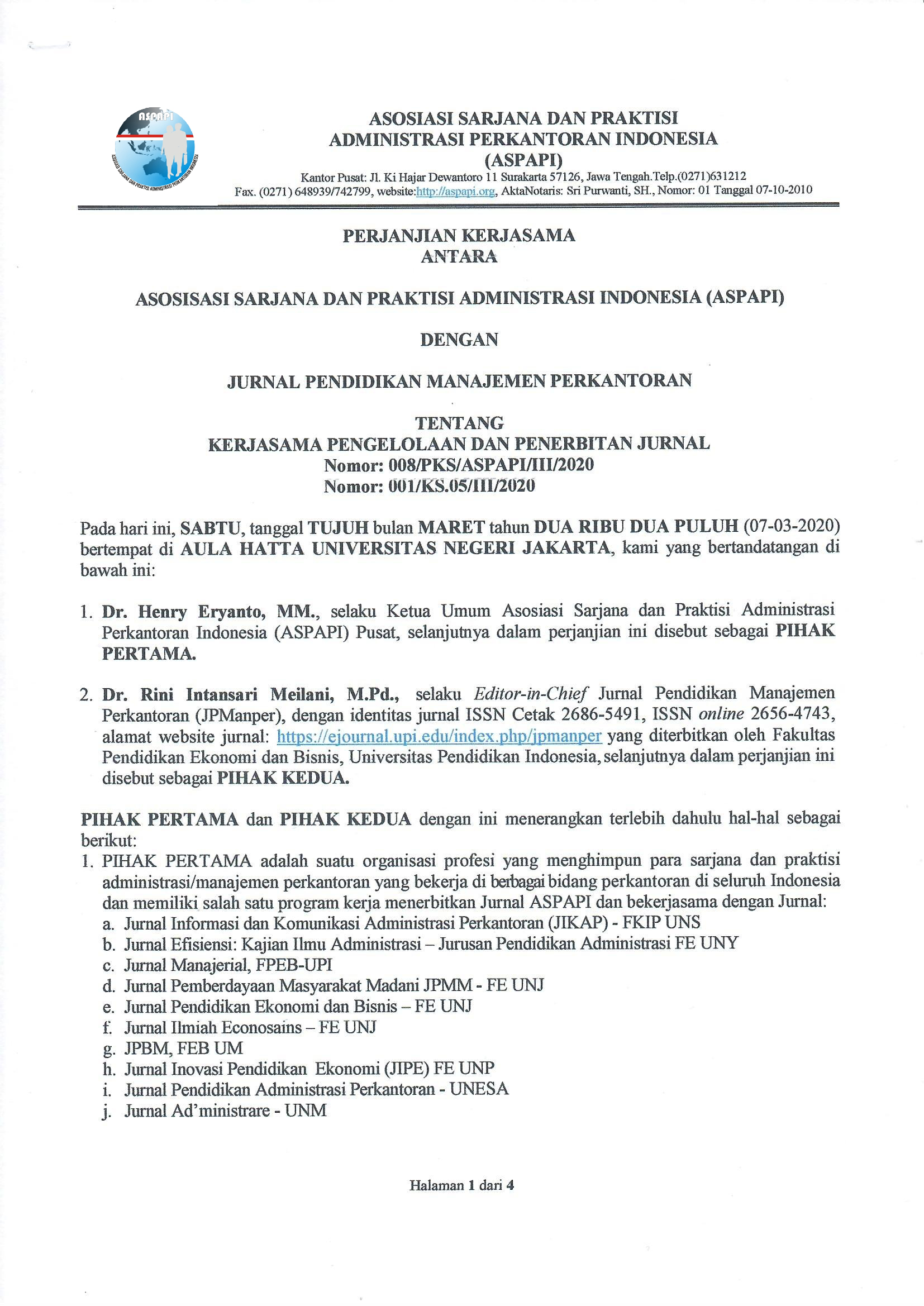IKLIM SEKOLAH SEBAGAI DETERMINAN MINAT BELAJAR SISWA
Abstract
This study aims to determine the effect of school climate on student's interest in vocational high school. The method used in this research is explanatory survey method methode method. Data collection techniques used questionnaires with a scale of 1 to 5 Likert scale models. Respondents were 66 students of class X of Office Administration in one of Vocational High School in Bandung. The technique of analysis using regression. The results showed that there is a positive influence between school climate on student learning interest. Thus the more conducive the school climate, the higher the student's interest in learning.
Abstrak
Penelitian ini bertujuan untuk mengetahui pengaruh iklim sekolah terhadap minat belajar siswa di sekolah menengah kejuruan. Metode yang digunakan dalam penelitian ini adalah metode penelitian explanatory survey methode. Teknik pengumpulan data menggunakan angket dengan skala 1 sampai dengan 5 model skala likert. Responden sebanyak 66 siswa kelas X Administrasi Perkantoran di salah satu Sekolah Menengah Kejuruan di Bandung. Teknik analisis menggunakan regresi. Hasil penelitian menunjukkan bahwa terdapat pengaruh yang positif antara iklim sekolah terhadap minat belajar siswa. Dengan demikian semakin kondusif iklim sekolah, maka semakin tinggi minat belajar siswa.
Keywords
Full Text:
PDFReferences
Abrantes, J. L., Seabra, C., & Lages, L. F. (2007). Pedagogical Affect, Student Interest, and Learning Performance. Journal of Business Research, 4 (5), 960-964.
Ainley, M., Hillman, K., & Hidi, S. (2002). Gender and Interest Processes in Response to Literary Texts: Situational and Individual Interest. Learning and Instruction, 12(1), 411-428.
Babatunde, M. M., & Olanjewaru, M. K. (2014). Class Size and School Climate as Correlates of Secondary School Students Scholatics Achievement in Itesiwaju Local Government Area of Oyo State, Nigeria. Global Journal of Human-Social Science: G Linguistics & Education, 14 (3), 14-21.
Barnes, K., Brynard, S., & Wet, C. d. (2012). The influence of school culture and school climate on violence in schools of the Eastern Cape Province. South African Journal of Education, 32(1), 69-82.
Galvez, I. E., Cruz, F. J., & Diaz, J. F. (2016). Evaluation of The Impact of Quality Management Systems on School Climate. International Journal of Educational Management, 30 (4), 474-492.
Hadi, S., & Farida, F. S. (2012). Pengaruh Minat, Kemandirian, dan Sumber Belajar terhadap Prestasi Belajar Siswa Pada Mata Pelajaran IPS Kelas VII SMP Negeri 5 Ungaran. Jurnal Pendidikan Ekonomi Dinamika Pendidikan , 7 (1), 8-13.
Hidi, S. (2006). Interest: A Unique Motivational Variable. Educational Research Review , 1, 69-82.
Jain, S., Cohen, A. K., Huang, K, Hanson, T. L., & Austin, G. (2015). Inequalities in School Climate in California. Journal of Educational Administration, 53 (2), 237-261.
Liakopoulou, M. (2011). The Professional Competence of Teachers: Which qualities, attitudes, skills and knowledge contribute to a teacher’s effectiveness?. International Journal of Humanities and Social Science, 1 (21), 66-78.
Lin, S. H., & Huang, Y. C. (2016). Examining Charisma in Relation to Student Interest in Learning Outcomes. Learning in Higher Education, 17 (2), 139-151.
Lischinsky, O. S., & Rosenblatt, Z. (2010). School Ethnical Climate and Teachers Voluntary Absence. Journal of Educational Administration, 48 (2), 164-181.
Majid, A. (2008). Perencanaan Pembelajaran. Bandung: Remaja Rosdakarya.
Olivia, F. (2011). Teknik Ujian Efektif. Jakarta: PT. Elex Media Komputindo.
Pashiardis, G. (2008). Toward a Knowledge Base for School Climate in Cyprus Schools. International Journal of Educational Management, 22 (5), 399-416.
Rapti, D. (2012). School Climate as an Important Component in School Effectiveness. International Scientific Journal, 1 (3), 111-125.
Rizal, A. S. (2015). Pengaruh Persepsi Tentang Iklim Sekolah Terhadap Minat Belajar Dan Kedisiplinan Belajar Siswa Jurusan Teknik Instalasi Tenaga Listrik SMK Boedi Oetomo 3 Maos Cilacap. Jurnal Pendidikan, 3 (3), 1-12.
Sahney, V. D. (2016). School Leadership and Its Impact on Students Achievement: The Mediating Role of School Climate and Teachers Job Satisfaction. International Journal of Educational Management, 30 (6), 1-30.
Sobandi, A. (2015) Produktivitas Sekolah Menengah Kejuruan: Studi tentang Pengaruh Kepemimpinan Kepala Sekolah, Kinerja Mengajar Guru, Iklim Sekolah, dan Fasilitas Pembelajaran terhadap Produktivitas SMK Bidang Keahlian Bisnis dan Manajemen di Kota Bandung. Disertasi. Universitas Pendidikan Indonesia. Tidak diterbitkan
Tajasom, A., & Ahmad, Z. A. (2011). Principals Leadership Style and School Climate: Teachers Perspectives from Malaysia. International Journal of Leadership in Public Services, 7 (4), 314-333.
Trumper, R. (2006). Factors Affecting Junior High School Students Interest in Physics. Journal of Science Education and Technology, 15 (1), 47-58.
Uline, C., & Moran, M. T. (2008). The Walls Speak: The Interplay of Quality Facilities, School Climate, and Student Achievement. Journal of Educational Administration, 46 (1), 55-73.
Voight, A., Hanson, T., Omalley, M., & Adekanye, L. (2015). The Racial School Climate Gap: Within-School Disparities in Students Experiences of Safety, Support, and Connectedness. American Journal of Community Psychologi, 56, 252-267.
Wang, Z., & Adesope, O. (2016). Exploring the Effects of Seductive Details with The 4-Phasemodel of Interest. Learning and Motivation, 55 (2), 65-77.
DOI: https://doi.org/10.17509/jpm.v3i1.9458
Refbacks
- There are currently no refbacks.
Copyright (c) 2018 Jurnal Pendidikan Manajemen Perkantoran
Jurnal Pendidikan Manajemen Perkantoran View My Stats



